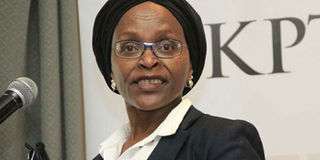Kenya is going to be unsafe for civil society

Gladwell Otieno, the executive director of Africa Centre for Open Governance, at the Sarova Stanley hotel in Nairobi on August 30, 2016. PHOTO | DIANA NGILA | NATION MEDIA GROUP
What you need to know:
Privately, Kenyan officials based at The Hague or attending the Assembly of States Parties found the episode a source of deep embarrassment.
It appears that they were wrong and Mr Mbiuki has access to and influences a sensitive part of the presidency.
Until President Uhuru Kenyatta’s ad hominem attack on the International Criminal Court and civil society in Kenya this week, a recent threat against Ms Gladwell Otieno at The Hague appeared like the outburst of an overly enthusiastic young official.
Mr Jasper Mbiuki, the President’s secretary for legislative affairs and compliance, threatened Ms Otieno with unspecified consequences after she put him down with an aphorism about patriotism being the last refuge of the scoundrel. “You chose to take that route, so be prepared for the consequences,” he had said to a roomful of people who included a Palestinian minister and officials from the Dutch Ministry of Foreign Affairs.
Ms Otieno was gracious in her response, saying, “Today, you may be threatening others and tomorrow you may come under threat. As civil society, we are not vengeful. If we subscribe to the principles that we say we do, then even when those who threaten us come under threat, and their rights are threatened, then we have a duty to defend those rights.”
Ms Otieno, who was one of four panellists at a lunch hour event on protecting human rights defenders, had touched a raw nerve while cataloguing incidents of witness elimination, bribery, and intimidation in the context of the Kenya cases at the ICC. In his response at question time, Mr Mbiuki questioned her patriotism and insinuated that she harboured a residual bitterness after the loss of her petition challenging Mr Kenyatta’s election in 2013. Ms Otieno and Mr Zahid Rajan’s petition to the Supreme Court to annul the 2013 presidential election was unsuccessful.
LEAVE ROOM
Mr Mbiuki’s repeated outbursts, characterised by speaking out of turn, shouting, and disrupting speakers, constrained panel chairperson Allan Ngari to invite him to leave the room. When he stayed put and kept raising his hand for a chance to speak, Mr Ngari pointedly ignored him for the remainder of the meeting. Thereafter, Mr Mbiuki said many other things that cannot be printed in a family newspaper in a conversation with Mr Njonjo Mue, the chairman of the Kenya Section of the International Commission of Jurists, within the hearing of several Kenyans.
Privately, Kenyan officials based at The Hague or attending the Assembly of States Parties found the episode a source of deep embarrassment. It appears that they were wrong and Mr Mbiuki has access to and influences a sensitive part of the presidency. The President’s aggression towards the ICC, where his own crimes against humanity charges were withdrawn in December 2014 when the prosecution could not mount sufficient evidence and from which he has promised withdrawal, and his targeting of civil society focused on governance and elections gives a good indicator of the posture his government will adopt in the days to come.
KIUNJURI WROTE
A week ago, Devolution Cabinet Secretary Mwangi Kiunjuri wrote to the Civil Society Reference Group to wash his hands off the operationalisation of the Public Benefit Organisations Act, 2013. As it were, an October 28 directive from the presidency had transferred public benefit organisations – commonly known as non-governmental organisations – to the State Department of Interior. It appears innocuous, but the conflation of civil society with security is a harbinger of big trouble.
The open hostility of the President’s actions and words appear in sharp relief against two ceremonies held last week to recognise human rights defenders: The Human Rights Defenders Awards recognised Munir Mazrui, Wanjeri Nderu-Musembi, Boniface Mwangi, and Winny Obure while the ICJ Kenya awarded the Year Award to lawyer Willie Kimani posthumously. Kenya is not going to be a safe place for civil society.
Kwamchetsi Makokha is programme adviser, Journalists for Justice.





